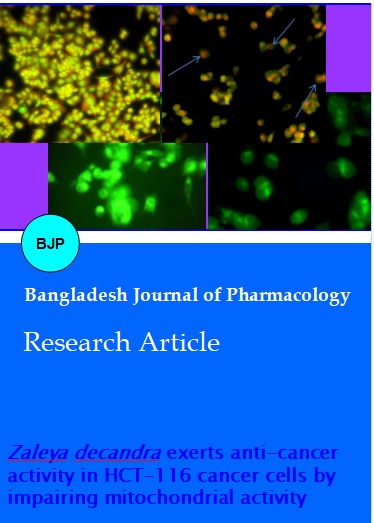Zaleya decandra exerts anti-cancer activity in HCT-116 cancer cells by impairing mitochondrial activity
DOI:
https://doi.org/10.3329/bjp.v14i4.42098Keywords:
Apoptosis, Caspases, Colon cancer cell, MTT, ROS, Zaleya decandraAbstract
An attempt has been made to investigate the role of Zaleya decandra on the survival of HCT colon cancer cells in vitro. The cell viability and apoptosis were assessed using MTT assay and acridine orange/ethidium bromide staining, respectively. Mitrochondrial membrane permeability was assessed using rhodamine-123 staining. The activities of caspases were evaluated using ELISA kits. Treatment with Z. decandra extract increased the production of ROS in HCT cells and impaired the mitochondrial activity as evidenced by decreased reduction of tetrazolium salt and enhanced mitochondrial membrane permeability. The onset of apoptosis was evident in cells treated with the extact in acridine orange/ethidium bromide staining and was associated with elevated levels of initiator and effector caspases in the conditioned medium. In conclusion, Z. decandra treatment promoted the apoptosis of HCT colon cancer cells.
Video Clip of Methodology:
6 min 53 sec: Click to watch
Downloads
178
202 Read
42

Published
How to Cite
Issue
Section
License
Authors who publish with this journal agree to the following terms:
- Authors retain copyright and grant the journal right of first publication with the work simultaneously licensed under a Creative Commons Attribution License that allows others to share the work with an acknowledgement of the work's authorship and initial publication in this journal.
- Authors are able to enter into separate, additional contractual arrangements for the non-exclusive distribution of the journal's published version of the work (e.g., post it to an institutional repository or publish it in a book), with an acknowledgement of its initial publication in this journal.
- Authors are permitted and encouraged to post their work online (e.g., in institutional repositories or on their website) prior to and during the submission process, as it can lead to productive exchanges, as well as earlier and greater citation of published work (See The Effect of Open Access).
